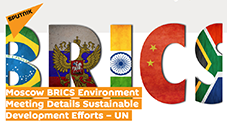The Environment Ministers of Brazil, Russia, India, China and South Africa (BRICS) gathered for their first official meeting, to discuss green economy development and cooperation in tackling climate change.
The Ministers highlighted that sustainable development should address in particular: poverty eradication; changing unsustainable and promoting sustainable patterns of consumption and production (SCP); protecting and managing the natural resource base of economic and social development; and addressing climate change.
 22 April 2015: The Environment Ministers of Brazil, Russia, India, China and South Africa (BRICS) gathered for their first official meeting, to discuss green economy development and cooperation in tackling climate change. The Ministers highlighted that sustainable development should address in particular: poverty eradication; changing unsustainable and promoting sustainable patterns of consumption and production (SCP); protecting and managing the natural resource base of economic and social development; and addressing climate change.
22 April 2015: The Environment Ministers of Brazil, Russia, India, China and South Africa (BRICS) gathered for their first official meeting, to discuss green economy development and cooperation in tackling climate change. The Ministers highlighted that sustainable development should address in particular: poverty eradication; changing unsustainable and promoting sustainable patterns of consumption and production (SCP); protecting and managing the natural resource base of economic and social development; and addressing climate change.
During the meeting, held on 22 April 2015, in Moscow, the Russian Federation, the BRICS Environment Ministers decided to: establish a Working Group on environment to identify and discuss priority areas of cooperation, which will convene its first meeting in 2015 in Russia; explore the potential of the BRICS New Development Bank for funding environmental projects; explore the possibility of establishing a collaborative platform of the BRICS countries, intended to share best environmental practices and facilitate the exchange of environmentally sound technologies and know-how with participation of public and private stakeholders; and hold regular meetings of Environment Ministers of BRICS.
They further said that they will consolidate efforts in their countries to develop policies contributing to mitigation efforts and adaptation of the national economies to the impacts of climate change, in accordance with the principles of: equity; common but differentiated responsibilities (CBDR) and respective capabilities (RC); and other provisions of the UN Framework Convention on Climate Change (UNFCCC).
“The BRICS nations hold a unique position as leading emerging economies and political powers at the regional and international level. Whilst mature economies across the globe grapple with towering budget deficits, anemic growth and rising unemployment, the BRICS are expanding rapidly, lifting people out of poverty and driving the global economy,” Achim Steiner, UN Environmental Programme (UNEP) Executive Director, told the meeting.
Steiner further noted that the BRICS’ efforts towards establishing an environmental public-private partnership (PPP) mechanism to facilitate investment in green technologies and related environmental projects in BRICS countries provide an opportunity to expedite and strengthen the global transition to a green economy. Innovative financial mechanisms under the BRICS, such as the New Development Bank and the Contingent Reserve Arrangement, have the potential to construct an enduring green infrastructure, longer-term competitiveness for the BRICS economies and strengthen South-South cooperation, he added.
Finally, Steiner said, “It is no exaggeration that success in Paris will largely depend on progress and agreement on the issue of climate finance.”
The future BRICS platform for sharing green technologies will be provided by the “Saint Petersburg Initiative,” which will be endorsed during the Seventh Summit of the BRICS, convening on 9-10 July 2015, in Ufa, the Russian Federation. The BRICS Summit is also expected to provide impetus to the upcoming Paris Climate Change Conference (UNFCCC COP 21), where countries aim to arrive at a new universal agreement on tackling climate change.
COP 21 will take place on 30 November-11 December 2015, in Paris, France. [UNEP Press Release] [BRICS Information Centre] [Sputnik News] [Xinhua News]